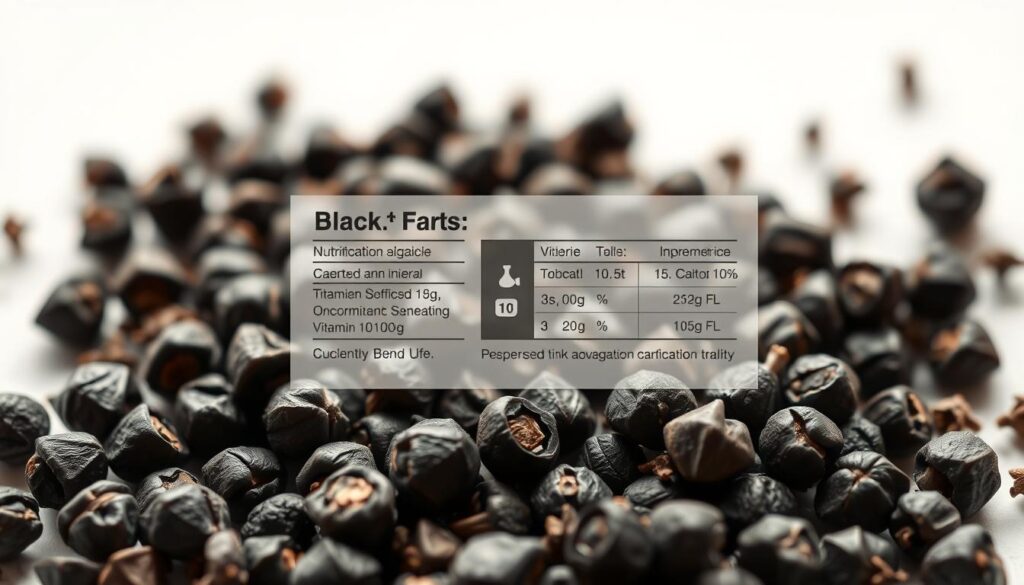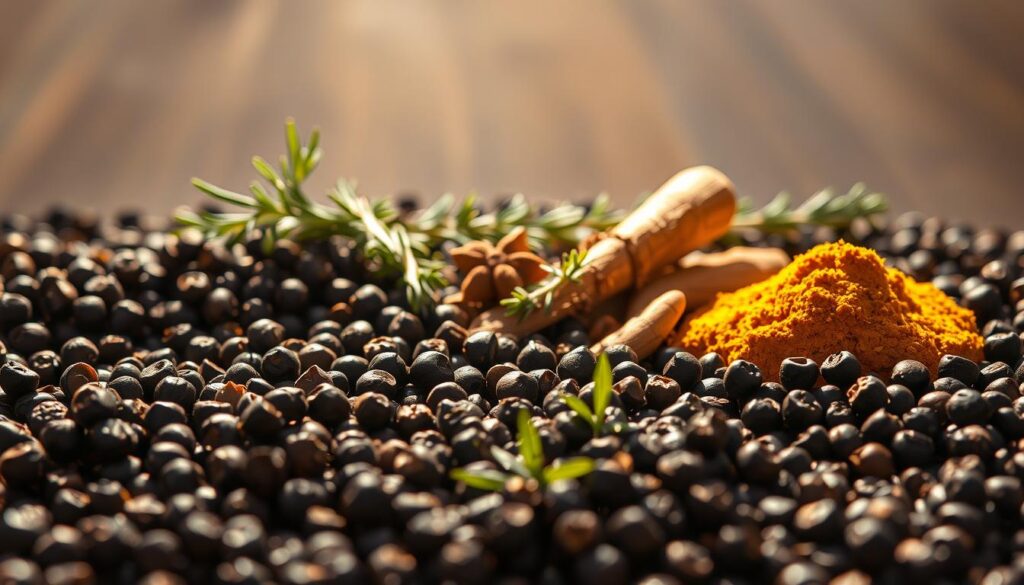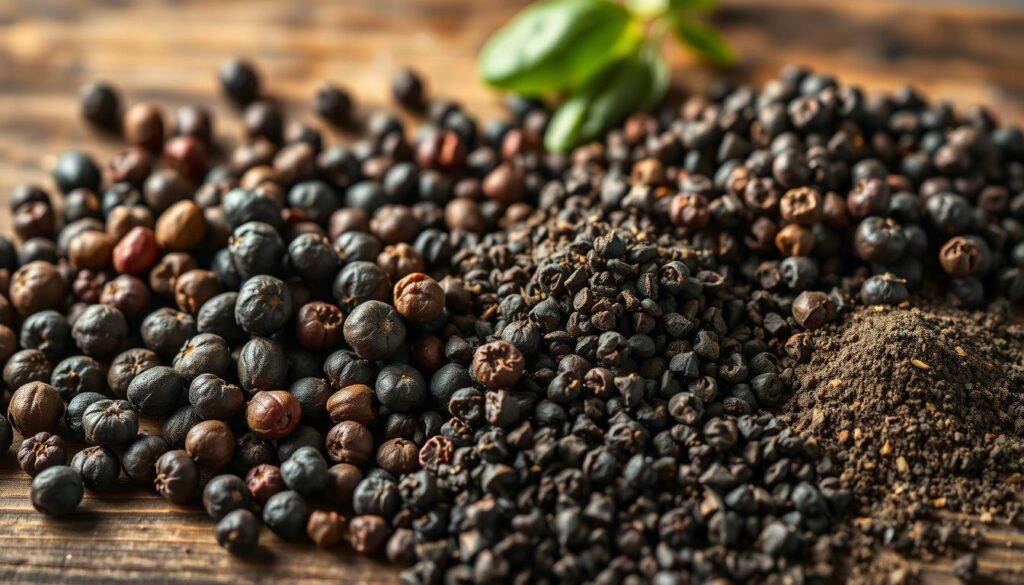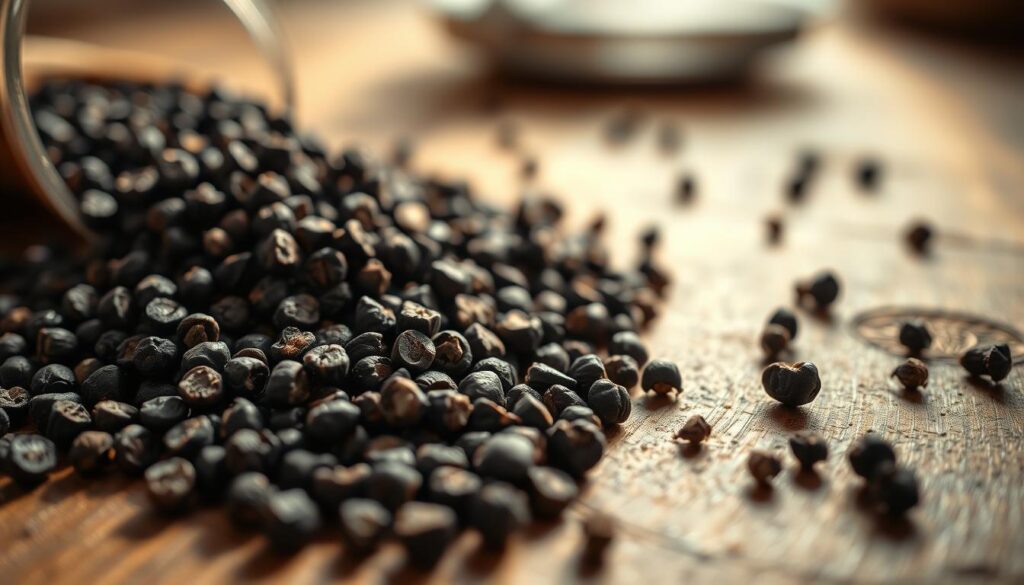Have you ever thought about how black pepper could improve your cooking and health? Known as the “King of Spices,” black pepper is a key ingredient in many dishes. It adds flavor and has health benefits. Let’s dive into its history, nutritional value, uses in cooking, and surprising health perks.
Key Takeaways
- Black pepper, a versatile spice, is renowned for both its flavor and health benefits.
- Rich in a powerful antioxidant called piperine, it helps combat free radical damage.
- Chronic inflammation is linked to serious health conditions, and black pepper may help reduce inflammation.
- Various studies suggest that black pepper can enhance memory and metabolic health.
- Integrating black pepper into your cooking could boost nutrient absorption significantly.
- This spice has been an essential ingredient in kitchens around the world for thousands of years.
Introduction to Black Pepper
Black pepper, known scientifically as Piper nigrum, is a staple in kitchens around the world. It comes from the Malabar Coast of India, in Kerala. This spice is loved for its sharp, slightly spicy taste, making dishes better.
There are over 600 types of black pepper, but three stand out: Black Tellicherry, Black Malabar, and Black Lampong. Vietnam is the biggest producer, showing how much people love it. It’s also very low in calories, with just 6 per teaspoon, and has no cholesterol or much fat or protein.
Black pepper is not just for flavor; it’s also good for you. It’s full of nutrients like copper, iron, and manganese. It also has vitamins A, E, and K. The compound piperine in black pepper helps your body absorb nutrients better and may protect cells from damage.
Keeping black pepper fresh is important. Whole peppercorns can last up to five years. But once ground, it only lasts two to three years. Grinding whole peppercorns just before using them makes your food taste better.
Black Pepper: A Benefit and Flavorful Kitchen Staple

Black pepper, known as Piper nigrum, has a rich history. It’s key in many cuisines around the world. Its history shows how it changed trade and culture over time.
Historical Significance of Black Pepper
Black pepper’s importance is huge. It’s been used for over 2000 years. It was more than just a spice; it was a valuable trade item.
In ancient times, it was used as money. This made it a big part of the spice trade. The trade changed economies across the world. It was introduced to Western cooking by Alexander the Great in the 4th century BCE. This was a big moment in food history.
Origin and Cultivation
Black pepper comes from India’s Malabar Coast. It grows well in tropical areas. Now, it’s grown in places like Vietnam, Brazil, and China too.
Harvesting black pepper is careful work. Green berries are picked and dried in the sun. This makes the brownish-black peppercorns we all know and love. This method helps it be widely available and used in many dishes.
| Aspect | Details |
|---|---|
| Historical Use | Used as currency in ancient trade routes |
| Culinary Introduction | Entered Western cuisine during Alexander the Great’s conquests |
| Geographic Origin | Malabar Coast of India |
| Current Cultivation Regions | Vietnam, Brazil, China, and India |
| Harvesting Method | Unripe green berries are dried to produce black peppercorns |
Nutrition Profile of Black Pepper

Black pepper is more than just a spice. It’s packed with nutrients that boost health and wellness. These compounds are key to its benefits.
Key Nutrients
Black pepper is a treasure trove of nutrients. It includes:
- Fiber
- Protein
- Iron
- Manganese
- Vitamin K
These nutrients are vital for our bodies. They help with digestion and nutrient absorption. Even a little black pepper can make a big difference in your meals.
Health-Boosting Compounds
Black pepper contains piperine, a powerful compound. Piperine boosts the absorption of nutrients, like curcumin, by up to 2,000%. This makes it a great addition to your meals.
Black pepper also fights oxidative stress. It’s good for your cells. Studies show it can help with pain and inflammation, just like some medicines.
Adding black pepper to turmeric can improve its absorption. This makes black pepper a key player in health. It also helps with digestion by increasing stomach acid.
| Nutrient | Benefits |
|---|---|
| Fiber | Aids in digestion and promotes a healthy gut. |
| Iron | Essential for red blood cell production and oxygen transport. |
| Manganese | Supports metabolism and bone development. |
| Vitamin K | Important for blood clotting and bone health. |
| Piperine | Enhances nutrient absorption and may have anti-inflammatory effects. |
Using black pepper in your cooking does more than add flavor. It adds nutrients and compounds that are good for you. It makes your meals both tasty and healthy.
Culinary Uses of Black Pepper

Black pepper is a versatile spice that makes many dishes better. It adds flavor and warmth to food. Knowing how to use black pepper can make cooking more fun and open up new tastes.
Common Cooking Applications
Black pepper is key for seasoning meats, veggies, and salads. It’s great for making rubs or spice blends. This spice adds a unique heat that works with both savory and sweet dishes. Here are some ways to use it:
- Seasoning meats for grilling or roasting.
- Adding to salad dressings for a kick of flavor.
- Incorporating into sauces and marinades.
- Enhancing dishes like soups and stews with depth.
- Utilizing in desserts such as chocolate truffles for an unexpected zing.
Pairing with Other Ingredients
Black pepper’s unique taste makes it perfect for mixing with other spices. It goes well with garlic, turmeric, and cumin. This mix helps create richer flavors in food. Here are some good pairings:
- Garlic and black pepper in roasted vegetables.
- Tumeric and black pepper in curry dishes for added complexity.
- Mixing with cumin in chili recipes for enhanced spiciness.
Global Cuisine and Black Pepper
Black pepper is a key spice in many global cuisines. It’s used in Italian sauces and Indian curries. Each culture uses it in its own special way:
- In Arabic cuisine, it’s key in spice mixtures like zhoug and baharat.
- It contributes to the aromatic layers of garam masala in Indian cooking.
- In French dishes, it plays a critical role in the flavor of quatre épices.
- American cuisine often includes a unique twist with lemon pepper seasoning for seafood dishes.
Health Benefits of Black Pepper

Black pepper is more than just a seasoning. It offers many health benefits that improve your overall well-being. The active compound in black pepper, called piperine, is key to its amazing properties. It makes black pepper a great addition to your diet.
Antioxidant Properties
Black pepper has strong antioxidant properties. Piperine fights free radicals in the body, which can cause damage and diseases. Eating foods rich in antioxidants may lower the risk of chronic diseases like heart disease, diabetes, and cancer. More studies are needed to confirm these benefits in humans.
Anti-Inflammatory Effects
Research shows black pepper has strong anti-inflammatory effects. A study found that black pepper, turmeric, and ginger helped patients with knee osteoarthritis as much as prescription drugs. This suggests it could help with chronic inflammation. Animal studies also show piperine may reduce inflammation in heart and kidney damage.
Support for Digestive Health
Black pepper boosts digestive health by increasing digestive enzyme secretion. This helps break down food better, easing issues like bloating and constipation. Adding a small amount of black pepper to your meals can improve nutrient absorption, even when paired with turmeric. Just a small amount, about an eighth of a teaspoon, is enough for the best results.
| Nutrient | Amount per 1 tsp (2.3g) |
|---|---|
| Energy | 5.77 calories |
| Protein | 0.239 grams |
| Carbohydrates | 1.47 grams |
| Fiber | 0.582 grams |
| Sugars | 0.015 grams |
| Calcium | 10.2 milligrams |
| Iron | 0.223 milligrams |
| Magnesium | 3.93 milligrams |
| Phosphorus | 3.63 milligrams |
| Potassium | 30.6 milligrams |
| Sodium | 0.46 milligrams |
| Zinc | 0.027 milligrams |
| Manganese | 0.294 milligrams |
| Selenium | 0.113 micrograms |
| Vitamin A | 12.6 micrograms |
Adding black pepper to your daily meals not only adds flavor but also brings many health benefits. It’s packed with antioxidants and anti-inflammatory compounds, and it supports digestive health. Making black pepper a regular part of your kitchen can lead to better health over time.
Scientific Research on Black Pepper

Recent years have seen a lot of research on black pepper, focusing on piperine. This research shows many health benefits, making black pepper interesting in cooking and health. Studies on piperine show it can improve how the body absorbs nutrients and boosts metabolism.
Studies on Piperine
Research on piperine shows it’s key for better vitamin and mineral absorption. It makes nutrients more available to the body during digestion. This means black pepper can make your food more nutritious when you cook with it.
Potential Impacts on Brain and Metabolic Health
Black pepper research also looks at its effects on brain health. Animal studies suggest it can help with cognitive function, even in degenerative diseases. It may improve brain performance and protect against age-related decline.
Also, black pepper could help control blood sugar levels, benefiting metabolic health. This makes black pepper not just a tasty addition but also a health booster.
Black Pepper in Traditional Medicine

Black pepper is key in traditional medicine across many cultures. It’s valued for more than just flavor. Its use in healing practices shows its importance in promoting health and treating illnesses.
Use in Ayurvedic Practices
In Ayurveda, black pepper is prized for its warmth. It’s used to treat respiratory problems like coughs and colds. Its ability to improve digestion makes it a staple in many remedies.
This shows how traditional medicine uses natural ingredients to boost health.
Historical Remedies
Black pepper has long been seen as a healing agent. It’s used to fight off common colds and other breathing issues. Its role in traditional medicine is clear, making it a cornerstone in many health practices around the world.
Types and Varieties of Black Pepper

Exploring black pepper reveals many types, each with its own unique traits. Knowing the popular varieties can boost your cooking skills. Each type offers a distinct flavor, perfect for different dishes.
Popular Varieties
Here are some notable types of black pepper:
- Tellicherry Peppercorns: These are the largest and most flavorful, making up the top 10% of the pepper crop.
- Malabar Black Pepper: A close second, it has a strong taste great for many recipes.
- Lampong Black Pepper: From Indonesia, it’s sharp and smoky, perfect for spice blends.
- Brazilian Peppercorns: Less flavorful, they’re often used by companies looking to save money.
- Green Peppercorns: Picked when green, they’re milder and preserved in brine, adding a unique taste.
- White Peppercorns: Processed to remove the skin, they have a different taste and are used in sauces.
Choosing Quality Black Pepper
For the best taste, choose quality black pepper. Freshness is key; buy whole peppercorns instead of ground. Whole peppercorns can last up to four years if stored right. Ground pepper, on the other hand, loses flavor fast, usually within six months.
Grind your peppercorns just before using to get the best flavor and aroma. This will make your dishes even more delicious.
How to Incorporate Black Pepper into Your Cooking

Black pepper is a key spice in kitchens everywhere. It adds heat and depth to dishes. By using some simple tips and recipe ideas, you can make your meals stand out.
Practical Tips
Always use freshly ground black pepper for the best flavor. Freshly ground peppercorns taste more vibrant than pre-ground ones. Add black pepper at different cooking stages for varying flavors.
Adding it early lets the spice blend with other tastes. Adding it just before serving gives a strong kick.
Delicious Recipe Ideas
Black pepper is versatile and can be used in many ways. Here are some ideas:
- Peppered Steak: This classic dish brings out the meat’s natural flavors, with a bold black pepper taste.
- Black Pepper Pasta: Mix cooked pasta with black pepper, olive oil, and cheese for a quick, tasty dish.
- Pepper-Infused Sauces: Add black pepper to sauces for meats or veggies to boost the flavor.
- Marinades and Dressings: Use black pepper in marinades for meats or in salad dressings to enhance the taste.
By following these tips, you can make your meals special. Black pepper adds a kick or a subtle touch to any dish. It’s a must-have for every home chef.
Common Questions About Black Pepper

Black pepper’s special place in the spice world sparks many questions. People often ask about its classification and how it differs from other peppers. They also wonder about substitutes for black pepper.
Is black pepper and pepper the same?
Black pepper comes from the dried berries of the Piper nigrum plant. It’s not the same as white pepper or green pepper. These peppers come from the same plant but are processed differently.
Black pepper is known for its strong flavor and pungency. It’s a key seasoning in many dishes. The main difference between black pepper and other peppers is their taste and use in cooking. Black pepper adds a spicier kick to global cuisine.
Can you substitute other spices for black pepper?
When you need a black pepper substitute, there are options. Cayenne pepper adds heat, while paprika brings a sweet smokiness. Crushed red pepper flakes can also work in some recipes.
Remember, these substitutes have their own unique tastes. They might not perfectly match black pepper’s flavor. Knowing these alternatives helps you keep your dishes flavorful, even without black pepper.
Conclusion
Black pepper is more than a spice; it’s a treasure for taste and health. Known as the “king of spices,” it boosts flavors and supports your health. Its nutritional value is impressive.
Studies show black pepper’s benefits, like antioxidants and better digestion. Adding it to meals can make dishes more flavorful. It also helps with health, like better fats and nutrient absorption.
Using black pepper in your cooking can make meals more enjoyable. It also brings health benefits. So, add this spice to your recipes for a taste and health boost.

